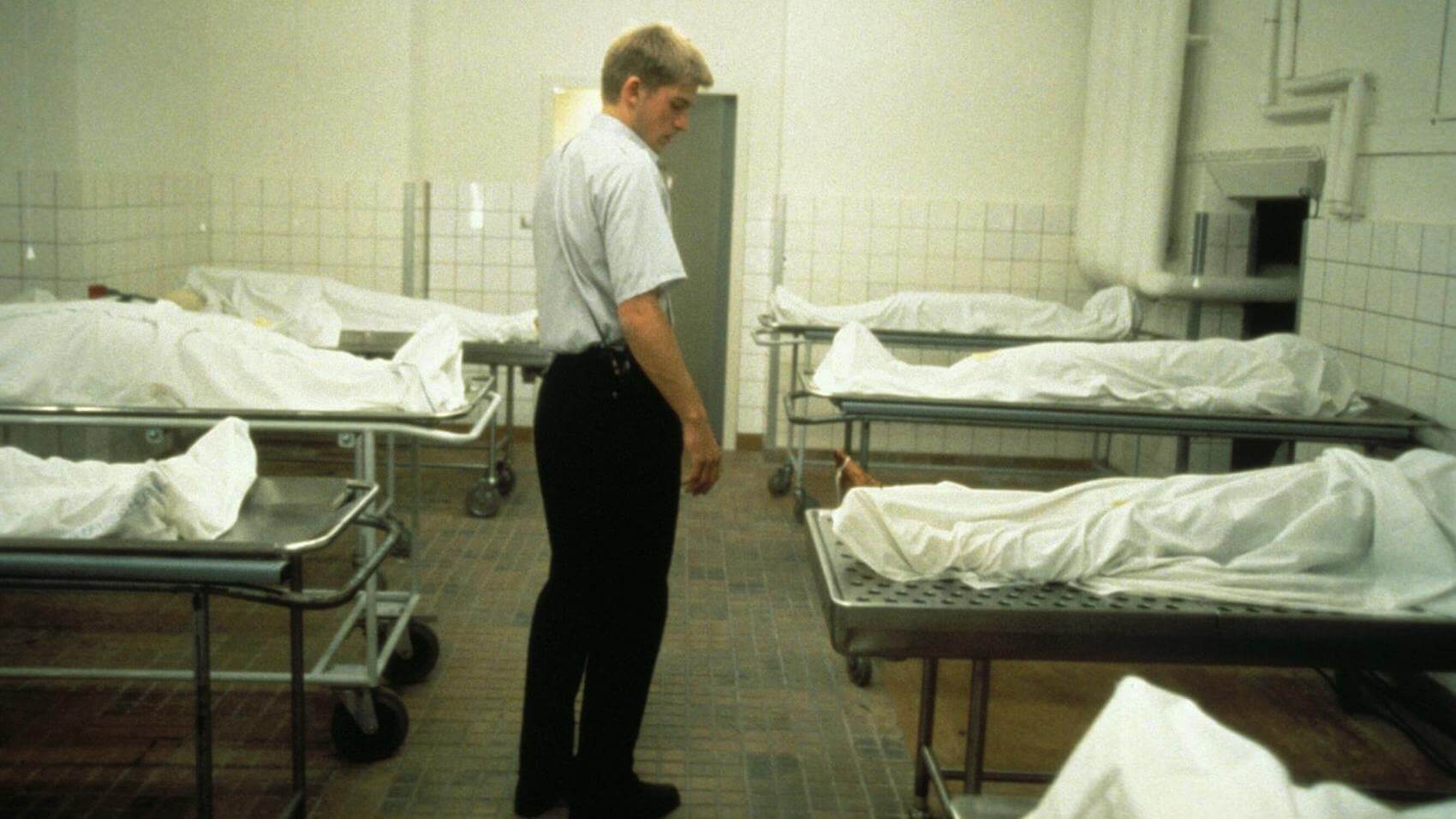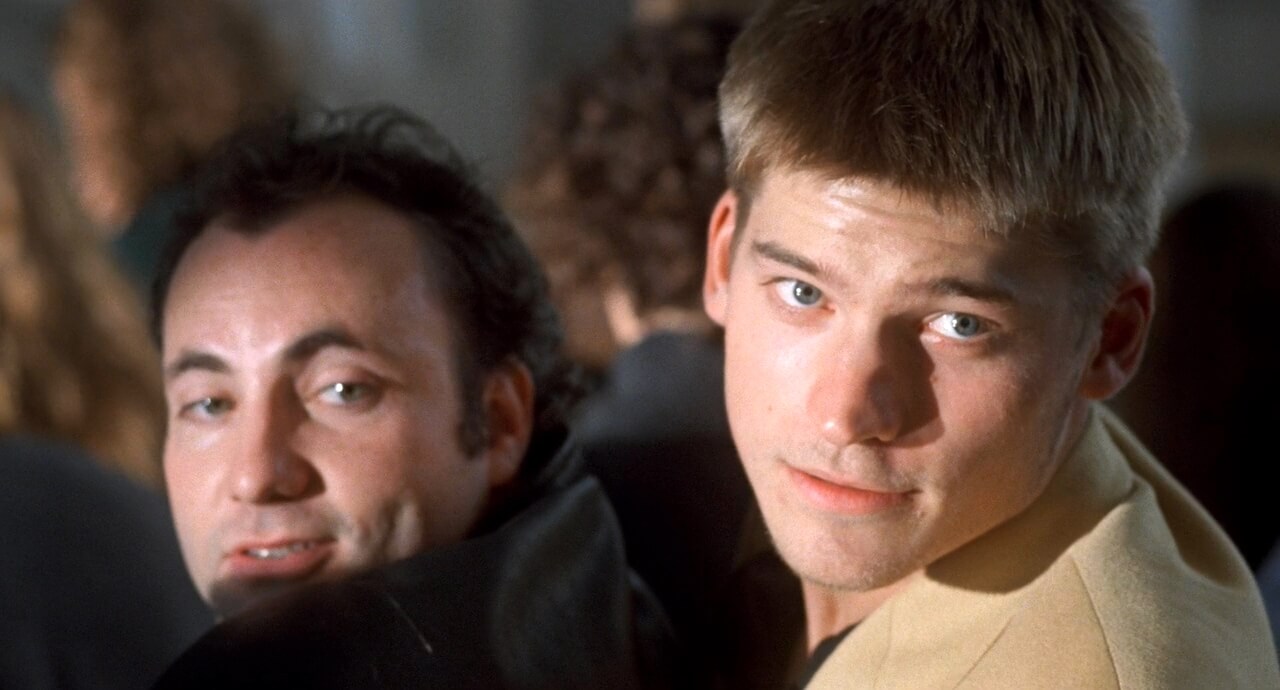NIGHTWATCH. Excellent Scandinavian scare fest

I don’t know if the reason why Americans are so eager to remake foreign hits is really due to their reluctance to read subtitles in the cinema, but regardless of whether this theory is true or not, it’s worth contemplating for a moment. The laziness of viewers often goes hand in hand with the laziness of filmmakers, who not only fail to offer something new but, above all, strive to recreate practically the same image once again, just this time in English. Rarely does it happen that a rehashed theme equals the original, let alone surpasses it, although there are honorable exceptions. For instance, the well-received The Ring by Gore Verbinski or Martin Scorsese’s The Departed, which, despite being based on a very good Chinese original, overshadowed it by winning a slew of Oscars.
Sometimes, however, producers are so determined to replicate the success of the original that they invite the same director to make the remake. This was the case with George Sluizer, the director of the Dutch thriller The Vanishing, who a few years later retold the story, relocating the action to the United States. Takashi Shimizu agreed to adapt his horror series Ju-on into The Grudge, and even Francis Veber, the most prolific French comedy creator since Moliere, succumbed to making Les Fugitifs in America, a remake of his original film with Pierre Richard and Gerard Depardieu. None of these new versions can be considered successful, let alone necessary. Nevertheless, this American method is still in practice (though somewhat less often), as if someone still believes it will prove its validity one day.
Danish thriller Nightwatch by Ole Bornedal was a big hit in the home country, and its success was noticed in Hollywood as well.

So it’s not surprising that three years later, the director signed on for a new version with Ewan McGregor in the lead role. I won’t spend too much time discussing the American film, not because it wasn’t successful. On the contrary, Bornedal managed to create an equally dark atmosphere as the original, all the while incorporating exceptionally dark humor and building tension masterfully. Those who hadn’t seen the earlier film could be satisfied with a good remake. But does it make any sense for the same director to make the same film twice?
The hero of Nightwatch, a law student named Martin (played by a debutant Nikolaj Coster-Waldau, later a star of Game of Thrones), takes a job as the titular night watchman at a city morgue. His predecessor warns him to buy a radio for work, which is one of the valuable pieces of advice that Martin receives before his first shift. It turns out that a person in such a place can get scared or even go mad, especially when working alone at night. When a madman starts murdering prostitutes in the city, the bodies of his victims end up at Martin’s workplace, and he soon becomes the target of the psychopath’s sick games.

In my previous discussions about Phantasm, I wrote about the fear of cemeteries and in Buried Alive about the dreadful awareness of being buried alive. I suspect that the thought of working at a morgue is related to these examples of subconscious fear of death. Bornedal intensifies this fear with the latest reports of the elusive killer’s bloody deeds, who is drawn to cold corpses and the specific atmosphere of the place of their temporary rest. Even without a sensational thread, the Dane can frighten the audience and the innocent Martin. By making him walk around the building every night, turn a key at specified times and places, and panic at the sight of a warning light indicating a “waking” corpse, the director pushes him to the brink of a nervous breakdown without actually doing anything extraordinary. He watches him at work – his unease when passing by the room with bat-filled formalin-filled bathtubs and his fear when looking at bodies covered with sheets. Even the guard room doesn’t feel like a sanctuary, with imprisoned and fluttering moths and a century-old prisoner’s photograph that disrupts the main character’s peace.

But even outside of his new job, Martin can’t feel safe. Along with his best friend, Jens (Kim Bodnia, known primarily for his roles in the early films of Nicolas Winding Refn), they challenge each other in a game of dares. Some of them are humorous, such as when one challenges the other not to take communion, presided over by his girlfriend. However, another bet leads to Martin meeting a prostitute who might know something about the series of murders. But this becomes irrelevant when Jens’ real target is not just embarrassing his friend but, most importantly, the girlfriend herself. The restaurant scene is the most shocking in the entire Nightwatch, even though there is no dead body there. Instead, we witness the hidden agenda behind seemingly innocent fun – the gentlemen mock all rules, religions, art, and, above all, other people. While Martin still retains some decency and feels guilty, Jens seems to be pushing his own boundaries at the expense of others. Of course, the night watchman will soon have doubts about his friend.

Bornedal, a faithful student of Hitchcock and, to some extent, a precursor of Nordic noir, which will conquer the world in the next decade, starts with a situation attractive to the viewer, placing morally ambiguous characters in it, and then creates an atmosphere of suspicion and mistrust, where falsehood tinged with uncertainty prevails. I am not talking about uncertainty related to the identity of the murderer – the clues that the director presents to the audience at the beginning of the film should make it clear who is the killer. Instead, Bornedal focuses on the men’s complexes. They cross the boundaries of honesty, morality, the law, and even humanity in their quest to prove their worth. How else can we describe the murderer’s necrophilic practices and his penchant for scalping his victims? Women here are reduced to the role of a piece of flesh that is either already cold and defiled or may become such. This image is not redeemed by Martin’s genuine love for his girlfriend or the last scene straight out of a romantic comedy. However, it would be a mistake to call Nightwatch chauvinistic – the director doesn’t attack women but rather men who lack the courage to change without harming others.

Nightwatch never resorts to excessive imagery; it prefers to suggest or show the effect of the madman’s actions rather than the act of violence itself. Therefore, the horror is not only in situating the film in the morgue but, perhaps even more so, in the awareness of the evil lurking within a person.
This, in turn, leads to the brink of absurdity and humor when the psychopath himself gets lost in the plot he constructed. Realizing he has made a serious mistake, he reacts with astonishment, and his face clearly shows the intellectual effort to find a reasonable explanation and a way out of a hopeless situation. Ultimately, he gives in, starting to smile and whistle, relieved that he no longer has to pretend or think. The repeated scene in the remake is equally impressive, demonstrating that madness is recognizable regardless of language, culture, or geographical location. Perhaps that’s why the American version of Nightwatch, though unnecessary, can defend itself as a well-made thriller with its distinctive touch intact.

However, the question of its justification remains – why did Bornedal agree to shoot the same film a second time? We can assume that money matters to the producers and that American audiences prefer not to read subtitles. But what, then, was going through the director’s mind when taking on the reimplementation of his own work? Are the Hollywood lights shining so brightly that they blind, making it impossible to say no? Or perhaps Bornedal wanted to somehow improve Nightwatch, seeing imperfections that needed to be rectified? Regardless of the answers, he, Sluizer, Shimizu, and Veber should know that they are not only making movies for Americans. Some films sound better in a language we don’t understand at all.

